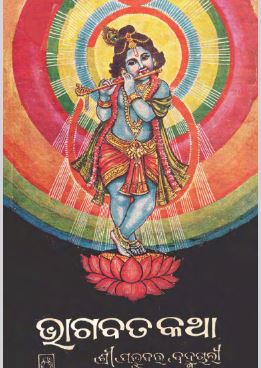Bhagabata Katha, written by Prabhudatta Brahmachari and translated by Upendra Nath Hota, is a timeless masterpiece that was published in 1984. This prose work beautifully captures the essence of the ancient Hindu scripture, the Bhagavata Purana, and presents it in an accessible and engaging manner.
The thirteenth verse of Bhagabata Katha delves into the fascinating interactions between two prominent characters in the scripture – Narad and Bharat. Narad, a celestial sage, is known for his musical abilities and is considered to be one of Lord Vishnu’s most ardent devotees. Bharat, on the other hand, is a wise king who renounced his empire to pursue a spiritual path.
In this verse, Narad approaches Bharat and expresses his deep admiration for the king’s steadfast devotion to the divine. With genuine humility, Bharat replies that it is by the grace of Lord Vishnu that he has been able to forsake his material desires and focus solely on his spiritual journey. Bharat recognizes that true renunciation lies not in abandoning one’s responsibilities but in letting go of attachment to the fruits of one’s actions.
Narad then poses a thought-provoking question to Bharat, asking whether it is possible to attain liberation solely through self-effort or if divine grace is necessary. Bharat replies with unwavering conviction that while self-effort is crucial, it is only when one’s actions are infused with divine grace that true liberation can be attained. He emphasizes the point that all actions must be dedicated to the Supreme, and it is through this surrender and devotion that one can transcend the cycle of birth and death.
The deep philosophical insights embedded in this verse highlight the importance of spiritual practice and surrendering to a higher power. It reminds readers that while personal effort is necessary, it must be coupled with the recognition of a greater cosmic force. This verse offers a profound lesson in humility, devotion, and the understanding that the path to liberation is not an easy journey but a result of divine grace.
Upendra Nath Hota’s translation of Bhagabata Katha is commendable as it succeeds in capturing the spirit and essence of the original text. Hota’s expertise in the subject matter, combined with his lyrical writing style, makes this translation an enriching read for both scholars and general readers.
Published in 1984, this translation has stood the test of time and continues to be a valuable resource for those seeking to explore the profound teachings of the Bhagavata Purana. The clarity and precision with which Hota conveys the intricate philosophical concepts is a testament to his deep understanding of the subject matter.
In conclusion, Bhagabata Katha V.13 by Prabhudatta Brahmachari, translated by Upendra Nath Hota, is a remarkable work that delves into the spiritual teachings of the Bhagavata Purana. This particular verse beautifully explores the dynamics between Narad and Bharat, offering profound insights into the path of devotion, surrender, and spiritual liberation. Hota’s translation, published in 1984, has proven to be an invaluable resource for those seeking to understand and appreciate this ancient Hindu scripture.
Books Info
| Books name | Bhagabata Katha-13 |
| Author | Prabhudata Brahmachari; Nilamani Misra, Tr. |
| No Of pages | 179 |
| Publisher | Cuttack students Store |
| Publication | 1984 |
| Printed At | Kalyani Prints |
| Distributor | NA |

